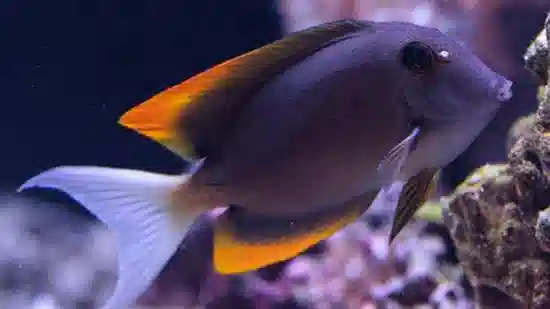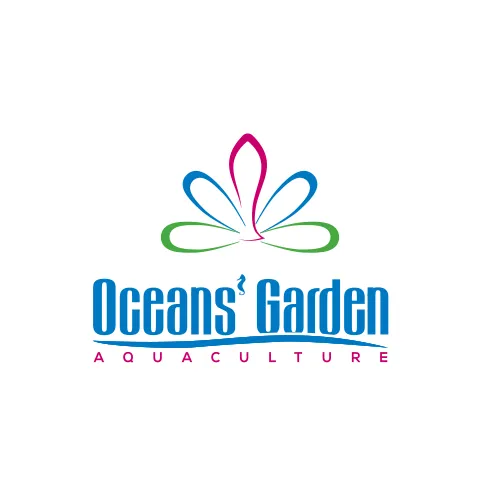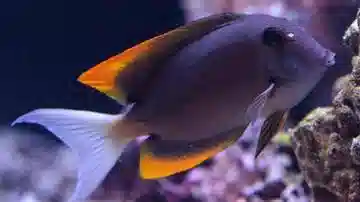Flame Fin (Tomini) Tang
Ctenochaetus tominiensis
(20 Reviews)

Flame Fin (Tomini) Tang
Ctenochaetus tominiensis
(20 Reviews)
{{ item.name }}
Size: {{ item.extra_field_3 }}
${{ getFormattedPrice(item.saleprice) }} ${{ getFormattedPrice(item.price) }}
To join the waiting list, click here
Free Shipping
With
$199.00
or more in Marine Life.
More details...
Flame Fin (Tomini) Tang Care Facts
| Care Level: | Easy |
|---|---|
| Temperament: | Peaceful |
| Diet: | Omnivore |
| Reef Safe: | Yes |
| Minimum Tank Size: | 70 gallons |
| Max Size: | 6 inches |
The Tomini Tang is commonly referred to as the bristletooth tomini tang, or Tomini Surgeonfish. As a juvenile, the Tomini Tang features yellow, blue, and white highlights, and as it matures the body color changes. It should be kept in a tank with plenty of swimming room. The Tomini Tang is moderately easy to care for, and is considered reef safe that can be housed with corals and small invertebrates like sexy shrimp. It is considered an excellent scavenger that is reef tank friendly, and is considered a prototypical janitors in your tank. The Tomini Tang is a peaceful fish but can be a bully to species that are introduced after it.
Tomini Tang (Ctenochaetus tominiensis) Aquarium Care Guide
Habitat of the Tomini Tang:
The Tomini Tang originates from the Western Pacific Ocean and is often found in areas with strong water flow, such as reef slopes and outer reef edges. In the wild, these fish graze on algae growing on rocks and coral structures. Understanding and replicating their natural habitat in captivity is crucial for their well-being.
Reef Compatibility of the Tomini Tang:
The Tomini Tang is considered reef safe. They are herbivores, primarily feeding on various types of algae. In a well-established reef aquarium, these tangs can contribute to controlling and preventing the overgrowth of unwanted algae. It's essential to ensure that your reef tank has enough algae for them to graze on.
Size and Lifespan of the Tomini Tang:
Tomini Tangs generally reach a size of about 5-6 inches (12-15 cm) when fully grown. They can live for 5-7 years with proper care, offering long-term enjoyment in your saltwater aquarium.
Diet in Captivity for the Tomini Tang:
Providing a balanced diet that resembles the Tomini Tang's natural feeding habits is essential in captivity. This should include high-quality marine flake or pellet food supplemented with fresh or dried seaweed, spirulina flakes, and occasional live algae when available. A diverse diet ensures they receive the essential nutrients and vibrant coloration for their health.
Aquaculture and Availability of the Tomini Tang:
Aquaculture of the Tomini Tang is uncommon; most of these tangs are still wild-caught. To minimize the stress of transitioning to captivity, sourcing your fish from reputable suppliers such as Saltwaterfish.com is recommended.
Compatibility with Other Fish and Invertebrates for the Tomini Tang:
Tomini Tangs usually exhibit a peaceful temperament. They can coexist well with various fish and invertebrates in a community tank. However, providing enough swimming space and hiding spots is essential to minimize territorial conflicts, which can occasionally occur with other tangs or similar species.
Sexual Dimorphism in the Tomini Tang:
Tomini Tangs do not display sexual dimorphism, meaning that males and females share similar physical characteristics and coloration.
Juvenile to Adult Coloration Changes in the Tomini Tang:
Juvenile Tomini Tangs possess vibrant coloration with a bright orange or reddish body and a striking white or yellow stripe along their dorsal fin. As they mature into adults, the intensity of these colors may become more subdued, but their fin coloration typically remains vibrant.
Temperament of the Tomini Tang:
Tomini Tangs are known for their peaceful temperament, rarely displaying aggressive behavior toward tank mates. This makes them suitable for community tanks with various species, provided each fish has enough space and hiding spots.
Tank Requirements for the Tomini Tang:
To ensure the well-being of your Tomini Tang, maintain a tank size of at least 70 gallons. This size allows for ample swimming space and enables the fish to exhibit its natural behaviors. Maintaining stable water conditions with a pH level between 8.1 and 8.4, a salinity level of 1.020-1.025, and a consistent temperature range of 74-82°F (23-28°C) is crucial. Adequate water flow, a protein skimmer, and regular water changes will help maintain water quality.
Common Names of the Tomini Tang:
The Tomini Tang is known by other common names, including the Flame Fin Tang and Tomini Bristletooth Tang.
Compatible Tank Mates With the Tomini Tang:
When selecting tank mates for your Tomini Tang, consider these five specific species that are less likely to provoke territorial disputes:
- Blue-Green Chromis (Chromis viridis)
- Banggai Cardinalfish (Pterapogon kauderni)
- Yellowtail Blue Damsel (Chrysiptera parasema)
- Orchid Dottyback (Pseudochromis fridmani)
- Pygmy Angelfish (Centropyge sp.)
Why Choose the Tomini Tang from Saltwaterfish.com:
The Tomini Tang is a stunning and peaceful addition to your marine aquarium. When acquiring this species, choosing a reputable source, such as Saltwaterfish.com, is essential. This ensures that your fish is well-acclimated to captivity, reducing stress and increasing its chances of thriving in your marine aquarium.
The Tomini Tang is a captivating and peaceful herbivore, making it an excellent choice for a reef tank. By providing a well-maintained aquarium, a balanced diet, and suitable tank mates, you can enjoy the beauty of this species while contributing to the well-being of your aquatic ecosystem. Choose Saltwaterfish.com as your trusted source for the Flame Fin Tomini Tang, and take the first step toward enhancing the visual appeal of your saltwater marine aquarium.
Reviewed by: Paul Shumaker on Dec. 29, 2025
Cute. hiding in rocks
Reviewed by: John Finley on Oct. 30, 2025
Beautiful fish. Very happy!
Reviewed by: Chad Krogh on Aug. 24, 2025
Good size, price and color.
Reviewed by: Jamie Strickland on April 27, 2025
Reviewed by: Robert Mcgill on March 5, 2025
Reviewed by: Robert Mishka on March 3, 2025
Beautiful and healthy. Packing was excellent and fish arrived in excellent condition. Great commutation through out the shipping process. Thanks a lot!
Reviewed by: Oscar Rodriguez on Jan. 26, 2025
Reviewed by: Scott Olson on Jan. 20, 2025
Very nice fish in their suitable for a 75 gallon tank.
Reviewed by: Richard Ponder on Jan. 20, 2025
Very Pleased. Customer service was great. Recommend highly.
Reviewed by: Charles Singer on Nov. 18, 2024
Reviewed by: Penny Mcglathery on March 25, 2024
The
Reviewed by: Debbie Konechney on March 21, 2024
Reviewed by: Debbie Konechney on March 21, 2024
Beautiful fish.
Reviewed by: Douglas Chadwick on Dec. 24, 2023
Reviewed by: Allan Rudolph on Dec. 12, 2023
Very active. Nips at everything in my quarantine tank, except the nori I put in.
Reviewed by: Christopher Reason on Oct. 25, 2023
This is the second one I’ve purchased. The first one died in quarantine within the first week. This one has an infect that I’m treating and he’s eating well and I’m hoping for the best. He is a beautiful fish!
Reviewed by: Jim Minor on Sept. 24, 2023
Arrived in great condition. Very healthy and living up to its purpose of eating algae and other foods.
Reviewed by: Donald Didonato on Aug. 30, 2023
Tang came in great shape and is a very nice addition to my reef. Very healthy fish.
Reviewed by: Nicole on Sept. 2, 2018
Reviewed by: Jerry Alderson on Oct. 21, 2014







